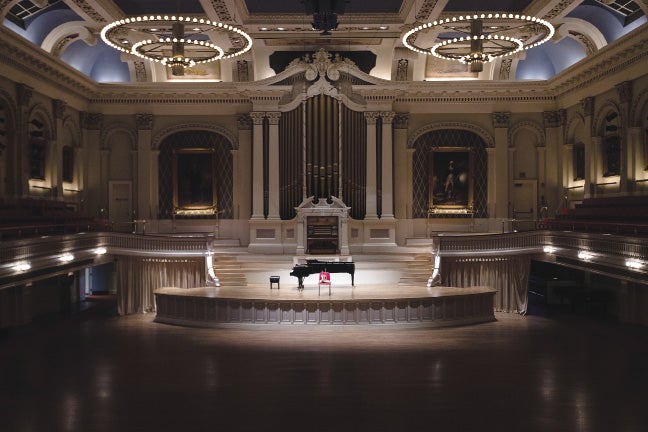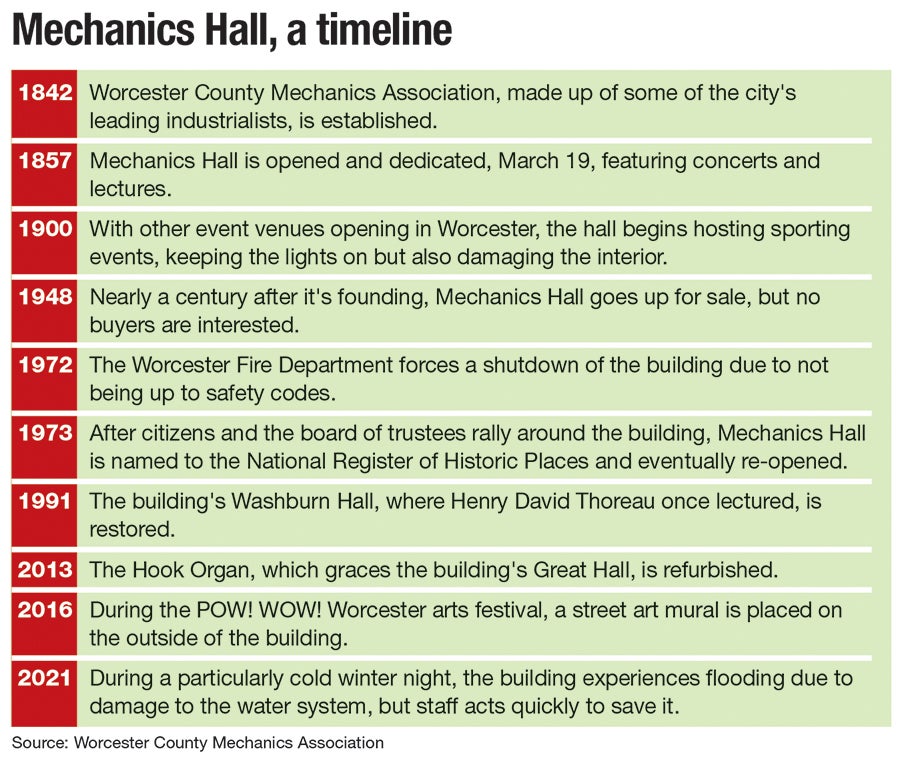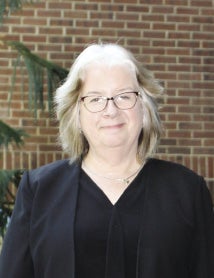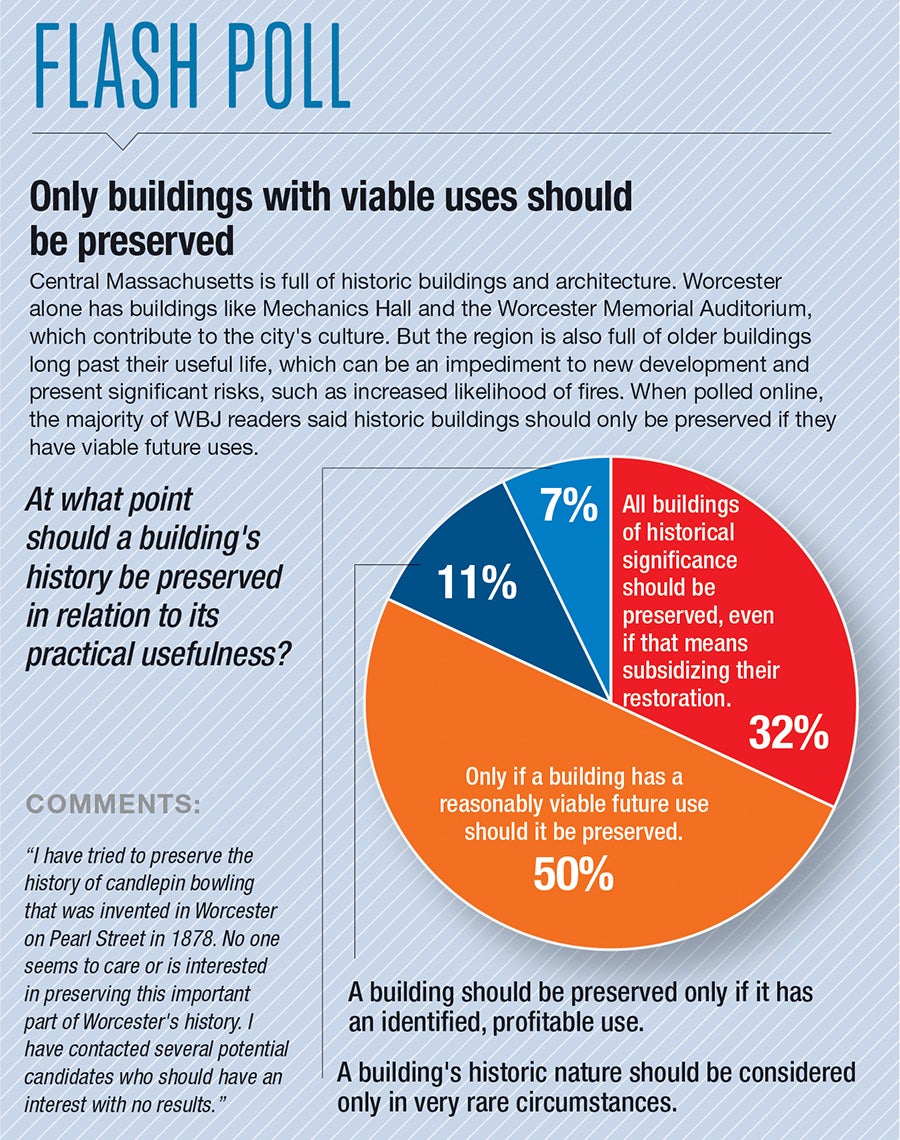Today’s efforts at historical preservation involve a myriad of different issues, from post-industrialization, increasing demographic diversity, and even climate change.
Get Instant Access to This Article
Subscribe to Worcester Business Journal and get immediate access to all of our subscriber-only content and much more.
- Critical Central Massachusetts business news updated daily.
- Immediate access to all subscriber-only content on our website.
- Bi-weekly print or digital editions of our award-winning publication.
- Special bonus issues like the WBJ Book of Lists.
- Exclusive ticket prize draws for our in-person events.
Click here to purchase a paywall bypass link for this article.
In the late 1960s, a group of citizens in Worcester were concerned about the fate of a particular building located on the city’s Main Street.
The city was undergoing rapid changes in an attempt at urban renewal, with older buildings being torn down and new structures going up in their stead. The construction of I-290, which would ultimately cleave the city in half, was approaching completion.
The building the citizens wanted to save, despite being built by Worcester’s leading industrialists, required repairs, and was threatened with closure due to not being up to code.
Many of the board of trustees of the building wanted to save it too, though others favored demolition. So architects were brought in to evaluate the condition of the building and see if it was worth preserving. They not only found the building to be in decent condition, but its acoustics and foundation made it one of the best-preserved buildings of its type from the pre-Civil War era.
That settled the dispute. The building was preserved, restored, and placed on the National Register of Historic Places.
That building is Mechanics Hall, now recognized as a high-functioning events venue and venerable institution in the city. The concerned citizens went on to form Preservation Worcester, now located in another historic building, the Salisbury House on Harvard Street. But the mission of both organizations remains far from finished, especially as the city undergoes another attempt to reform itself and be reborn.

“We’re definitely not opposed to new buildings, but we want them to have some character,” said Deborah Packard, the executive director of Preservation Worcester. “We’re not trying to save every building in this city, but we’re really focusing on what we consider the most significant buildings, either because of their architecture or because of some cultural consideration, or maybe a famous person lived there.”
Deciding what to save
Today’s efforts at historical preservation involve a myriad of different issues, from post-industrialization, increasing demographic diversity, and even climate change, as recycling old buildings can prevent waste production. Approaches to urban planning have changed drastically since Worcester’s first post-industrial renewal efforts in the 1970s, with a shift in focus away from cars to promoting walkability and community spaces.
“From an urban policy and zoning perspective, it incentivizes development that reuses the great historic fabric that’s already in place, reinvests in the public realm, in the civic commons and those unifying spaces that would oftentimes have been neglected,” said Vin Cipolla, CEO of the Boston-based Historic New England, one of the largest preservation societies in the region. “The ongoing effort or fight, if you will, is to recognize the importance of old buildings and how much they contribute to a vital and livable community fabric and how old spaces can have great new uses.”

Cipolla said Historic New England plans on holding an inaugural summit in October to bring together experts in the field of historic preservation, architecture, urban planning, agricultural conservation, the arts, and education from across the country to discuss the present-day challenges of preservation and how it interacts with building livable locations. The location for the summit? Mechanics Hall.
“Not only is it an incredibly iconic, historic building downtown, it’s also just a great place for a meeting,” Cipolla said. “In addition to it being a superior acoustic environment and a great performing arts center, it's one of the great meeting centers.”
The cost of saving history
Inside Mechanics Hall, plans to keep the building up to date and running smoothly are of the utmost importance since its original restoration in the 1970s. Kathleen Gagne, who serves as executive director, helps oversee its ongoing preservation efforts, such as upgrading the building’s sound and lighting to making improvements on Washburn Hall, an events room with a stage Henry David Thoreau once spoke on.
“The key to maintaining the building is to fix things that are broken right away,” Gagne said. “We make use of a long-range capital plan. We have a terrific property committee, composed of trustees and experts who are volunteers to make sure that we have resources to find the skills we need for whatever problems come up.”

That sort of immediate attention is needed for when unexpected problems sometimes arise. After a cold winter’s night in 2021, freezing temperatures caused a disruption in the building’s waterflow, and water seeped through the wooden floors and flooded the boiler system. Despite most of the staff being on furlough due to COVID-19, Gagne recalls everyone promptly showed up.
“The devotion required to make something like that happen is pretty impressive,” she said.
Though the building remains a popular venue, Gagne said Mechanics Hall, which is run as a nonprofit, relies on the support of donors to keep the building up to date. By Gagne’s estimate, around $250,000 a year is needed to make up the difference between its income and operational costs, and an additional $100,000 to $250,000 a year for capital improvements. Fortunately, the numerous local foundations and trusts across the city help Mechanics Hall meet those goals.
“Mechanics Hall is Worcester,” said Gagne. “That’s true in many ways, because all of the important things happened here during [the city’s] golden age. And I contend that many of the important things happen here today.”


